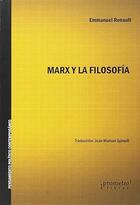What are the consequences of Marx's theoretical and political intervention for philosophy? Such is the general question that this book raises, considering it successively from three different points of view: a first part analyzes the general concepts that structure the debate about the "Marxist statute of philosophy"1 (criticism, dialectics and normativity) ; a second, applies to the period of youth during which Marx still expressed himself in an explicitly philosophical way; while a third is interested in the philosophical challenges and in the forms of permanence of modes of philosophical argumentation, typical of the critique of political economy.
All book titles by this author
|
Title |
Price | ||
|---|---|---|---|
|
|
Marx y la filosofía Author: Emmanuel Renault Publisher: Prometeo |
$477.00
10%$429.30 |
Shopping cart
Loading cart
Important notices
|
|
Revista Filosofía & Co. nº 9 Nueva revista de filosofia divulgativa y actualidad |
|
|
"Espacios de la filosofía" - Mauricio Beuchot - Novedad Herder México |
|
|
Revista Filosofía & Co. nº 8 Nueva revista de filosofia divulgativa y actualidad |
|
|
Hechos de tiempo Novedad Herder |
|
|
Revista Filosofía & Co. nº 7 Nueva revista de filosofia divulgativa y actualidad |
Pay safely with:


In the webshop
New
|
|
Seminarios II 67715 $400.00 -20.00% $320.00 |
|
|
Seamos como los hongos 68034 $440.00 -0.00% $440.00 |
|
|
Potencia de la dulzura 61957 $390.00 -0.00% $390.00 |
|
|
Seminarios I 66932 $400.00 -20.00% $320.00 |
|
|
Futuromanía 68038 $440.00 -0.00% $440.00 |
In the press
Promotions
|
|
La retórica del Romanticismo 67816 $1,070.00 -35.00% $695.50 |
|
|
La invención del racismo 67822 $580.00 -35.00% $377.00 |
|
|
Siglo XX. Entre la muerte del arte y el arte moderno 67846 $460.00 -35.00% $299.00 |
|
|
Los romanos y su imperio 67853 $319.00 -35.00% $207.35 |
|
|
Isis y Osiris 67817 $200.00 -35.00% $130.00 |





